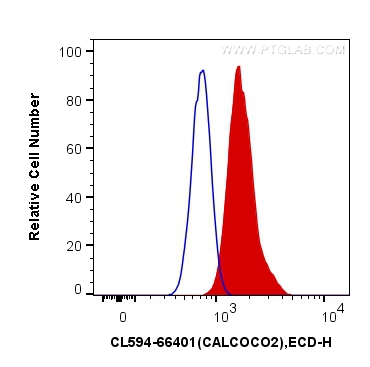CoraLite®594-conjugated NDP52 Monoclonal antibody
NDP52 Monoclonal Antibody for FC (Intra)
Host / Isotype
Mouse / IgG2a
Reactivity
human
Applications
FC (Intra)
Conjugate
CoraLite®594 Fluorescent Dye
CloneNo.
2F2C2
验证数据展示
经过测试的应用
| Positive FC detected in | Jurkat cells |
For other applications, we recommend the unconjugated version of this antibody, 66401-1-Ig
推荐稀释比
| Application | Dilution |
|---|---|
| Flow Cytometry (FC) | FC : 0.40 ug per 10^6 cells in a 100 µl suspension |
| It is recommended that this reagent should be titrated in each testing system to obtain optimal results. | |
| Sample-dependent, Check data in validation data gallery. | |
产品信息
CL594-66401 targets NDP52 in FC (Intra) applications and shows reactivity with human samples.
| Tested Applications | FC (Intra) |
| Tested Reactivity | human |
| Immunogen | NDP52 fusion protein Ag2866 种属同源性预测 |
| Host / Isotype | Mouse / IgG2a |
| Class | Monoclonal |
| Type | Antibody |
| Full Name | calcium binding and coiled-coil domain 2 |
| Synonyms | CALCOCO2, NDP52, Nuclear domain 10 protein 52, Nuclear dot protein 52 |
| Calculated Molecular Weight | 446 aa, 52 kDa |
| Observed Molecular Weight | 52 kDa |
| GenBank Accession Number | BC015893 |
| Gene Symbol | CALCOCO2 |
| Gene ID (NCBI) | 10241 |
| RRID | AB_2919986 |
| Conjugate | CoraLite®594 Fluorescent Dye |
| Excitation/Emission Maxima Wavelengths | 588 nm / 604 nm |
| Form | Liquid |
| Purification Method | Protein A purification |
| UNIPROT ID | Q13137 |
| Storage Buffer | PBS with 50% Glycerol, 0.05% Proclin300, 0.5% BSA, pH 7.3. |
| Storage Conditions | Store at -20°C. Avoid exposure to light. Aliquoting is unnecessary for -20oC storage. |
背景介绍
NDP52, also named as CALCOCO2, is an autophagy receptor. It plays a role in ruffle formation and actin cytoskeleton organization. Mouse/Rat NDP52 has some isoforms with MW 28-40 kDa and 67 kDa. Human NDP52 has some isoforms with MW 43-47 kDa and 52-55 kDa,
实验方案
| Product Specific Protocols | |
|---|---|
| FC protocol for CL594 NDP52 antibody CL594-66401 | Download protocol |
| Standard Protocols | |
|---|---|
| Click here to view our Standard Protocols |

